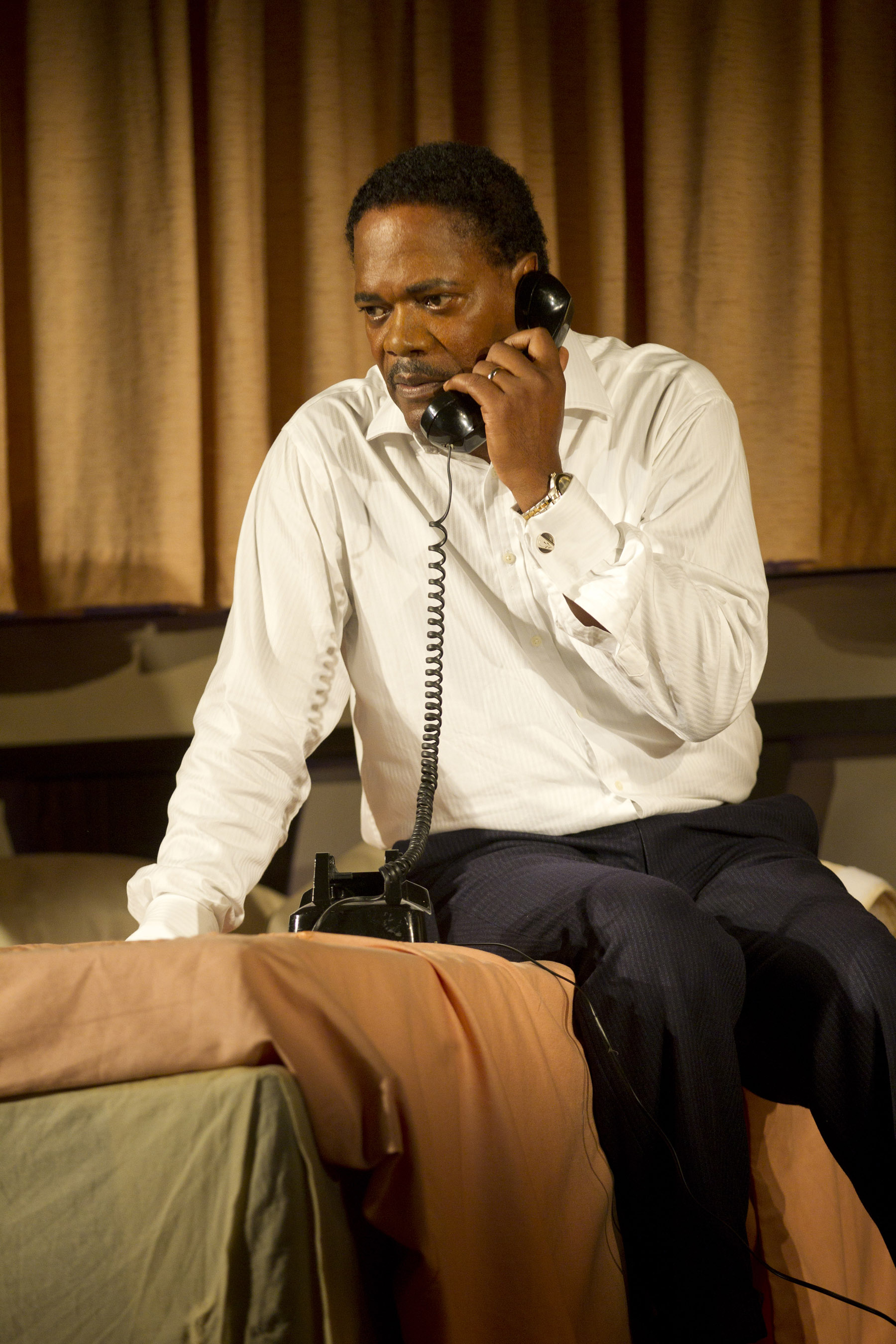Samuel L. Jackson and Angela Bassett Climb to the Mountaintop in Powerful New Martin Luther King Jr. Play
The Mountaintop
Bernard B. Jacobs Theater
242 W. 45th Street
New York, N.Y.

It’s pouring rain, with rattling thunder and bolts of lightning in the skies of Memphis, Tennessee, April 3, 1968, as Dr. Martin Luther King Jr. (Samuel L. Jackson) rushes into his room at the Lorraine Motel. He calls an aide to get him a pack of Pall Mall cigarettes and the front desk of the motel to order a cup of coffee. He’s tired, weary and unable to write much of his next speech. It’s another night in another town in another state on the long road to civil rights for King and his followers. It is also the night before he is assassinated.
A few moments later, a motel maid, Camae, played by Angela Bassett, bangs on the door of his room with a plastic tray and a coffee pot, torrents of rain falling around her. The bouncy, bubbly, sassy Camae bursts into the room and settles in. She is there for a reason and so is King.
From that meeting, Katori Hall’s new play, The Mountaintop, climbs its own mountain in both theatrical and historical triumph. The gifted Hall has written a stirring and often quite funny drama about King and his personal life, far from the roars of enormous crowds, the flash of bulbs in hundreds of cameras and the hallways of American history.
The play is the story of how a complete stranger, the exuberant, vital Camae, played majestically by Angela Bassett in a role that should garner her a Tony nomination, confronts King about his career and life. The two spar with each other throughout the play and, with a nifty plot trick, bring his entire legacy into question.
The Mountaintop is an historical winner. We all already know a lot about King, and the play quickly refreshes our memory. We learn more about all of his aides, his visit to Memphis to march with striking sanitation men, his “to the mountaintop/promised land” speech, his marriage, kids, friends and relations with the American people, of any color. The entire civil rights movement is paraded before the audience in the story of the interplay between the motel maid and the civil rights champion.
It’s incredibly hard for an actor to play Martin Luther King, Jr. He is so famous that anyone trying to play him faces an almost insurmountable challenge. You have to get down his emotions and character but, more than that, the uncanny cadence of his voice that made his speeches so historically memorable, such as his famed “I Have a Dream” speech in 1963 and his final “I’ve Been to the Mountaintop” speech given in Memphis the day before his death (and not coincidentally the day the play is set).
Samuel L. Jackson is pretty good, though. He’s a bit typecast in films as a bald, loud mouthed, menacing, gun-toting criminal or detective (notwithstanding his turn as a Jedi), but he has grown his hair and sports a wider moustache to play King. He does a fine job with the voice and the mannerisms. Most importantly, he provides the audience with a pretty authentic view of King the man, with his little passions for Pall Mall cigarettes, coffee and well-packed suitcases. He is not the perfect King, but he comes pretty damn close. There is fire in Jackson, too, as there was plenty of fire in King.
The star of the two-character show, though, is the feisty Bassett. She explodes on to the stage as a young Memphis woman just starting her job at the hotel. She dances and prances, cajoles and begs, shrieks and contorts. She plops herself down in chair and jumps up and down on a bed. She is saucy and irreverent, a bombshell of personality and pizzaz.
It is her job, as both a stranger and a woman, to pull King’s own hopes and dreams out of him as they talk in the motel room, to get him to admit that while many of the efforts in his life were triumphs, some failed.
Bassett’s Camae drives the story. At the very end of the play, she gives a hallelujah, fire and brimstone speech about King and his legacy, and the rights of all that has the audience on its feet cheering her on.
Everybody knows that King was murdered by James Earl Ray at 6:01 p.m. the following day. The play covers that but does so in a combination of both entertainment and journalism, giving the audience a powerful view of the killing and both its short and long aftermath.
You might think that with two stars such as Bassett and Jackson, director Kenny Leon did not have much work to do. But you’d be wrong. Two-actor plays like this need good direction to keep the pace moving and the play gets that from Leon. It is also hard to direct any play about a noted historical figure, but Leon does that well.
The Mountaintop does have its problems. Honestly, the play could use a few more characters. There are ten minutes or so in the middle that feels like dead weight. There could be more of a feel for the motel and the city of Memphis. Even so, it is both an historical stunner and theatrical winner.
Hall’s drama reminds you, too, that King was just 39 when he was cut down. He died too soon, way too soon.
PRODUCTION: Producers: Jean Doumanian, Sonia Friedman Productions, Ambassador Theatre Group, others, Sets: David Gallo, Costume: Constanza Romero, Lighting: Brian MacDevitt, Sound: Dan Moses Schreier. Directed by Kenny Leon.
Bruce Chadwick can be reached at bchadwick@njcu.edu.